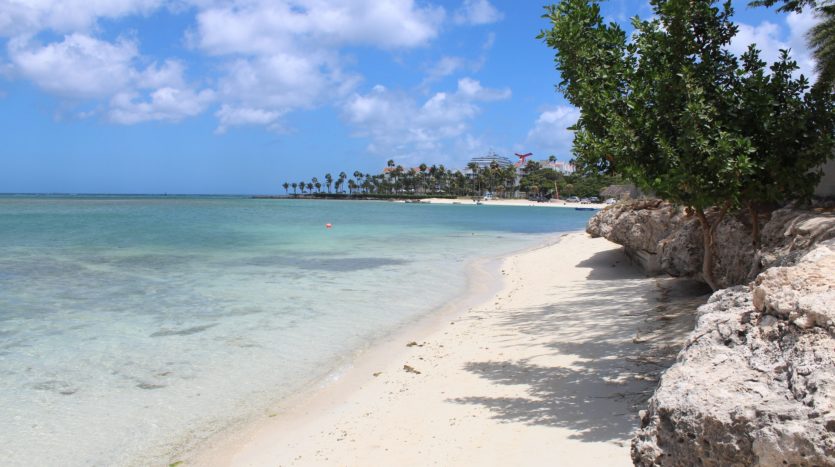What do you need to know before you buy Aruba property? This post will answer all the common questions and give you an overview of the process.
Aruba is a popular destination for expats from around the world. With world-class beaches, beautiful weather and great healthcare, it has also become a popular retirement destination. There is something for everyone in Aruba!
The basics
Here are the steps to buy a property in Aruba:
- Find a suitable property and write an offer (we know some great agents in Aruba…please let us know if you would like an introduction).
- Negotiate the price and terms until you and the seller are satisfied with the contract.
- All parties sign the contract.
- The signed contract is delivered to a notary along with a deposit from you equal to 10% of the purchase price. Notaries are appointed to their role by the government and are required by law to complete certain tasks in all property transactions.
- The notary does all of the legal documentation and title work in the transaction. This part of the process typically takes anywhere from one to three months and delays are common. Patience is important during this step.
- Once the notary’s work is complete, you will sign the deed and make the payment for the balance of the purchase price and closing costs.
- The final step is paying the transfer tax and any prorated property taxes, which must be paid before the transaction can be recorded.
Compared to other Western countries, the closing costs when buying Aruba property can seem a little steep. The notary cost is 2% of the purchase price and you will also have to pay a transfer tax up to 6% of the purchase price. The transfer tax is calculated using a sliding scale that is based on the value of the property.
There are two types of annual property taxes–a property tax of 0.4%, and a land tax of USD $0.85 per square meter. The first USD $34,000 in property value is not subject to property taxes.
Can foreigners own Aruba property?
Yes, Aruba property can be owned by anyone. The government of Aruba encourages foreign investment.
What sort of visa do I need in order to visit Aruba?
Citizens of most countries in North America, South America and Europe can visit Aruba for up to 90 days with no visa. Visitors on a tourist visa are not allowed to work during their stay. Tourist visas can sometimes be extended for an additional 90 days if there are extenuating circumstances.
What sort of visa do I need to move to Aruba?
You will need to apply for a residency permit if you plan to stay in Aruba for longer than 90 days at a time. The residency permits are good for one year and can be renewed every year.
Because Aruba is a territory of the Kingdom of the Netherlands, citizens of the Netherlands, Curaçao, St Maarten, Bonaire, Sint Eustatius and Saba will have an easier time with the residency process if they decide to relocate to Aruba.
How do mortgages work in Aruba?
(This is the part that US citizens do not like to hear) Mortgages can be obtained by foreigners in Aruba, but they do not have the same low rates and low down-payment options that are available in the US. The banks that provide mortgage loans for Aruba property require at least 35% of the purchase price as a down payment, and the rates at the time of this writing (spring 2021) are roughly 6%.
The mortgage qualification process in Aruba is similar to the process in other parts of the world. It includes asset verification, employment and/or income verification and references from your other bank(s) or brokerage(s). They will also require an independent appraisal of the subject property before issuing a mortgage loan.
What is the difference between freehold and leasehold property in Aruba?
Aruba property has two types of land classifications: Freehold and leasehold.
Freehold land in Aruba is owned by the holder of the property deed. There are no annual payments required on freehold land aside from the standard property and land taxes.
Leasehold land is owned by the government and is leased to title holders for 60-year terms. These properties require a small, annual lease payment. The 60-year terms automatically renew for an additional 60-year term, along with a slight increase in the annual lease payments. Even though the land is leased, the lease holders can buy, sell, mortgage and otherwise use the land as they see fit.
Much of the land in the popular areas of Aruba is leasehold land.
What else do I need to know about Aruba property?
Advantages:
- Aruba has some of the least expensive property per square meter in the Caribbean.
- It is relatively easy to rent your property when you are not there due to the heavy tourist traffic.
- Aruba is a central location for those who wish to explore the Caribbean, South America or Central America.
- Because mortgages in Aruba have strict requirements, there is little to no speculation. That helps to protect property values.
Disadvantages:
- Real estate in Aruba (like real estate everywhere else in the world) is illiquid. It may take some time to sell your property due to factors outside of your control.
- Transaction costs when purchasing property are high.
- You will need to take a boat or an airplane to visit Aruba, which can be difficult if there are future global events like the COVID-19 pandemic.
- You are limited to 180 days of time in Aruba per year unless you are pursuing a proper residency permit. A residency permit will take extra work and may have personal tax implications.
If you have questions about buying property in Aruba that we haven’t answered here, please contact us. We are always happy to help.

